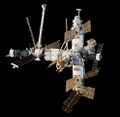Template:Selected anniversaries/April 3: Difference between revisions
Jump to navigation
Jump to search
No edit summary |
No edit summary |
||
| Line 31: | Line 31: | ||
||Solomon Kullback (b. April 3, 1907) was an American cryptanalyst and mathematician, who was one of the first three employees hired by William F. Friedman at the US Army's Signal Intelligence Service (SIS) in the 1930s, along with Frank Rowlett and Abraham Sinkov. | ||Solomon Kullback (b. April 3, 1907) was an American cryptanalyst and mathematician, who was one of the first three employees hired by William F. Friedman at the US Army's Signal Intelligence Service (SIS) in the 1930s, along with Frank Rowlett and Abraham Sinkov. | ||
||Richard Wilhelm Heinrich Abegg (d. April 3, 1910) was a German chemist and pioneer of valence theory. He proposed that the difference of the maximum positive and negative valence of an element tends to be eight. This has come to be known as Abegg's rule. Pic. | |||
||1922 – Joseph Stalin becomes the first General Secretary of the Communist Party of the Soviet Union. | ||1922 – Joseph Stalin becomes the first General Secretary of the Communist Party of the Soviet Union. | ||
Revision as of 18:04, 26 January 2018
1693: Carpenter and clockmaker John Harrison born. He will invent a marine chronometer, a long-sought-after device for solving the problem of calculating longitude while at sea.
1827: Physicist, musician, and academic Ernst Chladni dies. He has been called both the father of acoustics and the father of meteoritics.
1841: Inventor and crime-fighter Charles Grafton Page publishes new class of Gnomon algorithm functions which detect and prevent crimes against mathematical constants.
1998: Mathematician and academic Mary Cartwright dies. She did pioneering work in chaos theory.
1999: Sensors on the Mir spacecraft detect patterns of electricity which reveal existence of a vast artificial intelligence in the Earth's ionosphere.





